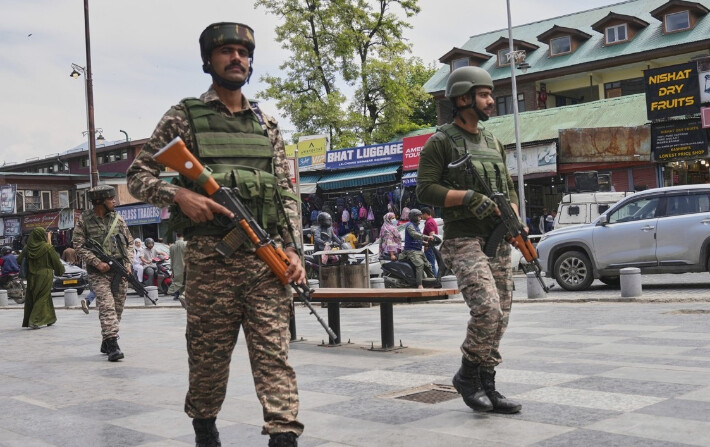
The volatile relationship between nuclear-armed rivals India and Pakistan has once again plunged into a dangerous crisis, with both nations exchanging missile strikes in the early hours today. The latest conflagration, ignited by a deadly terrorist attack in the disputed region of Kashmir, has triggered widespread international concern over the potential for a catastrophic escalation in a region already fraught with historical animosity and complex geopolitical dynamics.
The immediate trigger for the current exchange was a devastating gun attack last month in a popular resort in Indian-administered Kashmir, which resulted in the tragic deaths of 26 individuals, including tourists. India swiftly and vehemently accused Pakistan of orchestrating the attack, a charge vehemently denied by Islamabad. In a move designed to exert pressure, New Delhi reportedly took the drastic step of blocking the flow of tributary rivers of the Indus River, a vital water source for Pakistan, further inflaming tensions. Pakistan responded by closing its airspace to Indian aircraft and, in a chilling reminder of the stakes involved, even alluded to the possibility of nuclear retaliation in the event of further aggression.
Against this backdrop of heightened rhetoric and escalating tensions, the situation took a perilous turn as the Indian military launched what it termed 'Operation Sindoor' at dawn today. This operation reportedly involved missile strikes targeting nine locations, including areas within Pakistan-administered Kashmir and the Punjab province. The impact of these strikes was immediately apparent, with Pakistani authorities confirming the tragic loss of eight civilian lives, including children, and the injury of over 30 others in the Muzaffarabad area. Local residents recounted scenes of terror as missiles rained down, shattering the early morning calm.
Pakistan's response was swift and assertive. The Pakistani military claimed to have retaliated by shooting down five Indian fighter jets and launching its own missile strikes against targets within Indian territory. While these claims are subject to verification, they underscore the tit-for-tat nature of the escalating conflict and the willingness of both sides to engage in direct military action. Skirmishes and exchanges of fire are reportedly ongoing along the Line of Control (LoC), the de facto border that divides the disputed Kashmir region, further highlighting the precariousness of the situation on the ground.
The history of conflict between India and Pakistan since their independence in 1947 is long and bloody, with Kashmir remaining a central point of contention. The two nations have already fought several wars, and the shadow of their nuclear arsenals has long loomed over their interactions. The February 2019 crisis, triggered by a suicide bombing in Indian-administered Kashmir, brought the two countries to the brink of another full-scale war, highlighting the inherent dangers of their intertwined security dynamics.
The international community has reacted to the latest escalation with palpable alarm. The United Nations has issued urgent calls for maximum military restraint from both sides, emphasizing the catastrophic potential of a wider conflict between two nuclear-armed states. US President Donald Trump, while acknowledging the long history of conflict between the two nations, expressed hope for a swift resolution, underscoring the global concern over the situation's trajectory.
The possession of nuclear weapons by both India and Pakistan introduces a terrifying dimension to their rivalry. The doctrine of mutually assured destruction (MAD), while credited with preventing large-scale wars between nuclear powers during the Cold War, carries immense risks in a regional context marked by deep mistrust and the potential for miscalculation. The possibility of a localized conflict spiraling out of control, or even the accidental use of nuclear weapons, remains a significant concern for global security.
However, some analysts cautiously suggest that the very presence of nuclear weapons might act as a deterrent against a full-scale conventional war, with both sides acutely aware of the catastrophic consequences of crossing certain thresholds. India's assertion that its recent strikes targeted only terrorist elements and not Pakistani regular army facilities could be interpreted as an attempt to limit the scope of the conflict and signal a desire to avoid further escalation.
Despite these cautious hopes, the situation remains highly volatile. The cycle of attack and retaliation carries the inherent risk of misinterpretation and unintended escalation. The international community's role in de-escalating the crisis is crucial. Diplomatic efforts aimed at fostering dialogue, promoting transparency, and urging restraint from both sides are urgently needed to prevent the region from sliding into a potentially devastating conflict. The long-standing issue of Kashmir, at the heart of this enduring rivalry, requires a sustained and peaceful resolution to ensure lasting stability in the region and mitigate the ever-present threat of nuclear confrontation. The world watches with bated breath as these two nuclear neighbors navigate this latest dangerous chapter in their complex and often perilous relationship.
[Copyright (c) Global Economic Times. All Rights Reserved.]



























